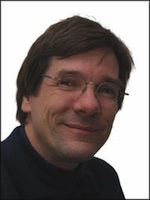Go to
Lothar Thiele
Platforms for CPS - Adaptive, predictable and efficient
If visions and forecasts of industry come true then we will be soon surrounded by billions of interconnected embedded devices. We will interact with them in a cyber-human symbiosis, they will not only observe us but also our environment, and they will be part of many visible and ubiquitous objects around us.
We have the legitimate expectation that the individual devices as well as the overall system behaves in a reliable and predictable manner. This is an indispensable requirement as it is infeasible to constantly maintain such a large set of devices. In addition, there are many application domains where we rely on a correct and fault-free system behavior. We expect trustworthy results from sensing, computation, communication and actuation due to economic importance or even catastrophic consequences if the overall system is not working correctly, e.g., in industrial automation, distributed control of energy systems, surveillance, medical applications, or early warning scenarios in the context of building safety or environmental catastrophes. Finally, trustworthiness and reliability are mandatory for the societal acceptance of human-cyber interaction and cooperation.
It will be argued that we need novel architectural concepts, an associated design process and validations strategies to satisfy the strongly conflicting requirements and associated design challenges of platforms for CPS: Handle at the same time limited available resources, adaptive run-time behavior, and predictability.
A possible approach is based on (a) horizontal integration of components through interfaces that avoid interference on shared resources and that enable compositional design, (b) event-based design process that allows to formally prove end-to-end system properties, and (c) a corresponding validation and testing environment.
About the panel speaker:
 Lothar Thiele was born in Aachen, Germany on April 7, 1957.
Lothar Thiele was born in Aachen, Germany on April 7, 1957.
He received his Diplom-Ingenieur and Dr.-Ing. degrees in Electrical Engineering from the Technical University of Munich in 1981 and 1985 respectively. After completing his Habilitation thesis from the Institute of Network Theory and Circuit Design of the Technical University Munich, he joined the Information Systems Laboratory at Stanford University in 1987.
In 1988, he took up the chair of microelectronics at the Faculty of Engineering, University of Saarland, Saarbrucken, Germany. He joined ETH Zurich, Switzerland, as a full Professor of Computer Engineering, in 1994.
His research interests include models, methods and software tools for the design of embedded systems, cyberphysical systems, sensor networks, embedded software and bioinspired optimization techniques.
Lothar Thiele is associate editor of IEEE Transaction on Industrial Informatics, IEEE Transactions on Evolutionary Computation, Journal of Real-Time Systems, ACM Transactions on Cyberphysical Systems, Journal of Signal Processing Systems, Journal of Systems Architecture, and INTEGRATION, the VLSI Journal.
In 1986 he received the "Dissertation Award" of the Technical University of Munich, in 1987, the "Outstanding Young Author Award" of the IEEE Circuits and Systems Society, in 1988, the Browder J. Thompson Memorial Award of the IEEE, and in 2000-2001, the "IBM Faculty Partnership Award". In 2004, he joined the German Academy of Sciences Leopoldina. In 2005, he was the recipient of the Honorary Blaise Pascal Chair of University Leiden, The Netherlands. Since 2009 he is a member of the Foundation Board of Hasler Foundation, Switzerland. Since 2010, he is a member of the Academia Europaea. In 2013, he joined the National Research Council of the Swiss National Science Foundation. Lothar Thiele received the "EDAA Lifetime Achievement Award" in 2015.
Secondary navigation
- EPFL Workshop on Logic Synthesis and Emerging Technologies
- Luca Amaru
- Luca Benini
- Giovanni De Micheli
- Srini Devadas
- Antun Domic
- Rolf Drechsler
- Pierre-Emmanuel Gaillardon
- Jie-Hong Roland Jiang
- Akash Kumar
- Shahar Kvatinsky
- Yusuf Leblebici
- Shin-ichi Minato
- Alan Mishchenko
- Vijaykrishnan Narayanan
- Ian O'Connor
- Andre Inacio Reis
- Martin Roetteler
- Julien Ryckaert
- Mathias Soeken
- Christof Teuscher
- Zhiru Zhang
- Symposium on Emerging Trends in Computing
- Layout synthesis: A golden DA topic
- EPFL Workshop on Logic Synthesis & Verification
- Luca Amaru
- Luca Benini
- Robert Brayton
- Maciej Ciesielski
- Valentina Ciriani
- Jovanka Ciric-Vujkovic
- Jason Cong
- Jordi Cortadella
- Giovanni De Micheli
- Antun Domic
- Rolf Drechsler
- Henri Fraisse
- Paolo Ienne
- Viktor Kuncak
- Enrico Macii
- Igor Markov
- Steven M. Nowick
- Tsutomu Sasao
- Alena Simalatsar
- Leon Stok
- Dirk Stroobandt
- Tiziano Villa
- Symposium on Emerging Trends in Electronics
- Raul Camposano
- Anantha Chandrakasan
- Jo De Boeck
- Gerhard Fettweis
- Steve Furber
- Philippe Magarshack
- Takayasu Sakurai
- Alberto Sangiovanni-Vincentelli
- Ken Shepard
- VENUE
- Panel on Circuits in Emerging Nanotechnologies
- Panel on Emerging Methods of Computing
- Panel on The Role of Universities in the Emerging ICT World
- Panel on Design Challenges Ahead
- Panel on Alternative Use of Silicon
- Nano-Bio Technologies for Lab-on-Chip
- Functionality-Enhanced Devices Workshop
- More Moore: Designing Ultra-Complex System-on-Chips
- Design Technologies for a New Era
- Nanotechnology for Health
- Secure Systems Design
- Surface Treatments and Biochip Sensors
- Security/Privacy of IMDs
- Nanosystem Design and Variability
- Past Events Archive

